US President Joe Biden and his Chinese counterpart, Xi Jinping (習近平), yesterday spoke by telephone on mounting tensions over Taiwan, a festering trade dispute and their bid to keep the superpower rivalry in check.
In Taipei, the Ministry of Foreign Affairs said it is closely following all top-level US-China communications, with ministry spokeswoman Joanne Ou (歐江安) saying that Washington had informed Taiwan of the call between Biden and Xi in advance.
The White House said the phone call started at 8:33am in Washington.
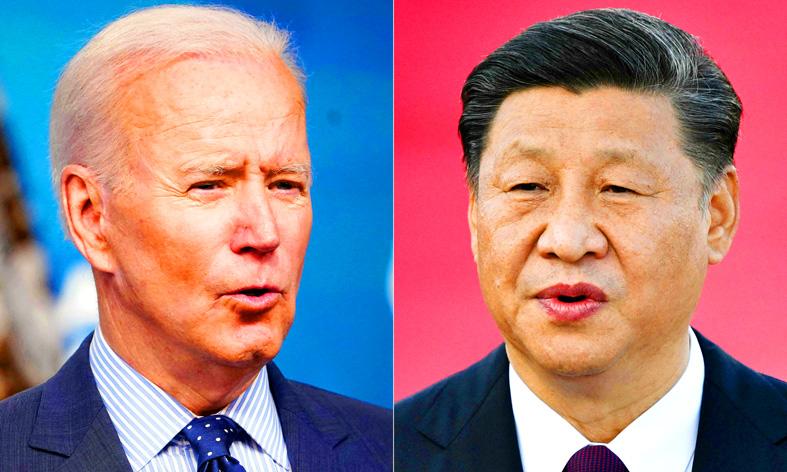
Photo: AFP
A statement would be issued after the call ended, a spokesman said.
While this was Biden’s fifth conversation with Xi since becoming president a year and a half ago, it was getting hard to mask deepening mistrust between the two countries.
Already stuck in a trade war, Beijing and Washington increasingly risk open conflict over Taiwan, with little sign of resolution on either front.
“Tensions over China’s aggressive, coercive behavior in the Indo-Pacific” will be high on the agenda, White House National Security Council spokesman John Kirby said.
The latest flashpoint is a possible trip by US House of Representatives Speaker Nancy Pelosi, which has spurred grim warnings from Beijing that Washington would “bear the consequences.”
The dispute around Pelosi’s trip is the tip of an iceberg, with US officials fearing that Xi is mulling use of force to impose control over Taiwan.
Once considered unlikely, an invasion, or lesser form of military action, is increasingly seen by China watchers as possible — perhaps even timed to boost Xi’s prestige when he moves later this year into a third term.
According to the White House, Biden’s chief goal is to establish “guardrails” for the two superpowers.
This is meant to ensure that while they sharply disagree on democracy, and are increasingly rivals on the geopolitical stage, they can avoid open conflict.
“He wants to make sure that the lines of communication with President Xi on all the issues, whether they’re issues again that we agree on or issues where we have significant difficulty with — that they can still pick up the phone and talk to one another candidly,” Kirby said.
Where to place the guardrails, is challenging amid so many unresolved disputes, including a simmering trade war begun under former US president Donald Trump.
Asked whether Biden could lift some of the 25 percent import duties placed on billions of US dollars of Chinese products by Trump, Kirby said there was still no decision.
“We do believe ... that the tariffs that were put in place by his predecessor were poorly designed. We believe that they’ve increased costs for American families and small businesses, as well as ranchers. And that’s, you know, without actually addressing some of China’s harmful trade practices,” Kirby said.
However, “I don’t have any decision to speak to with respect to tariffs by the president. He’s working this out,” he said.
Additional reporting by Lu Yi-hsuan
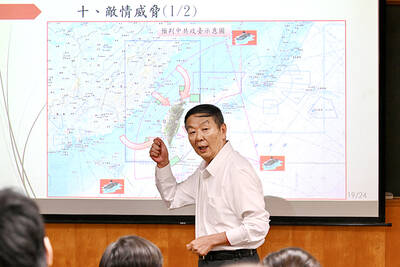
RETHINK? The defense ministry and Navy Command Headquarters could take over the indigenous submarine project and change its production timeline, a source said Admiral Huang Shu-kuang’s (黃曙光) resignation as head of the Indigenous Submarine Program and as a member of the National Security Council could affect the production of submarines, a source said yesterday. Huang in a statement last night said he had decided to resign due to national security concerns while expressing the hope that it would put a stop to political wrangling that only undermines the advancement of the nation’s defense capabilities. Taiwan People’s Party Legislator Vivian Huang (黃珊珊) yesterday said that the admiral, her older brother, felt it was time for him to step down and that he had completed what he
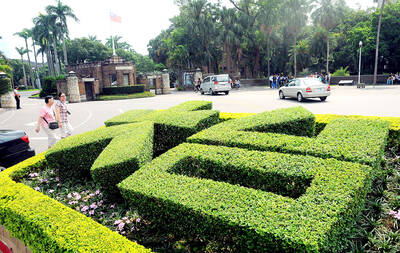
Taiwan has experienced its most significant improvement in the QS World University Rankings by Subject, data provided on Sunday by international higher education analyst Quacquarelli Symonds (QS) showed. Compared with last year’s edition of the rankings, which measure academic excellence and influence, Taiwanese universities made great improvements in the H Index metric, which evaluates research productivity and its impact, with a notable 30 percent increase overall, QS said. Taiwanese universities also made notable progress in the Citations per Paper metric, which measures the impact of research, achieving a 13 percent increase. Taiwanese universities gained 10 percent in Academic Reputation, but declined 18 percent
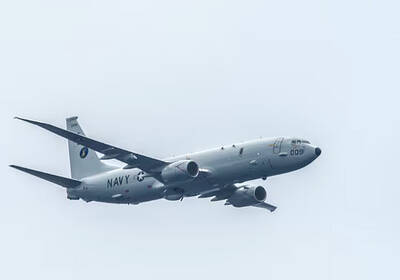
CHINA REACTS: The patrol and reconnaissance plane ‘transited the Taiwan Strait in international airspace,’ the 7th Fleet said, while Taipei said it saw nothing unusual The US 7th Fleet yesterday said that a US Navy P-8A Poseidon flew through the Taiwan Strait, a day after US and Chinese defense heads held their first talks since November 2022 in an effort to reduce regional tensions. The patrol and reconnaissance plane “transited the Taiwan Strait in international airspace,” the 7th Fleet said in a news release. “By operating within the Taiwan Strait in accordance with international law, the United States upholds the navigational rights and freedoms of all nations.” In a separate statement, the Ministry of National Defense said that it monitored nearby waters and airspace as the aircraft
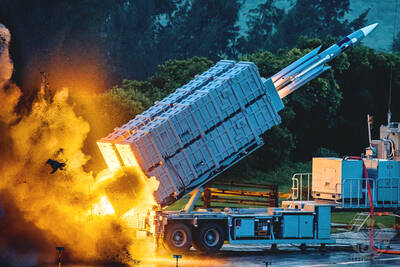
UNDER DISCUSSION: The combatant command would integrate fast attack boat and anti-ship missile groups to defend waters closest to the coastline, a source said The military could establish a new combatant command as early as 2026, which would be tasked with defending Taiwan’s territorial waters 24 nautical miles (44.4km) from the nation’s coastline, a source familiar with the matter said yesterday. The new command, which would fall under the Naval Command Headquarters, would be led by a vice admiral and integrate existing fast attack boat and anti-ship missile groups, along with the Naval Maritime Surveillance and Reconnaissance Command, said the source, who asked to remain anonymous. It could be launched by 2026, but details are being discussed and no final timetable has been announced, the source